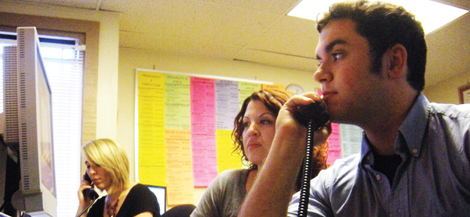Since 1986, Teen Lifeline has taken youth suicide seriously and found a way to relate to troubled teens—through a peer-to-peer program.

A simple phone call, for many, can lift someone’s spirit, provide comfort and ease stress. For a teen who dials into to Teen Lifeline, a call can do that and so much more; it could save a life.
Celebrating 26 years in the Valley, Teen Lifeline was founded on the mission of reducing teen suicide by using a peer-to-peer system: teens with suicidal thoughts, depression or family issues could call a hotline for help. Instead of speaking to an adult, they are greeted with the judgment-free voice of another teenager.
In 1986, around the time Teen Lifeline was founded, Arizona ranked second in the nation for suicide among teenagers, says Executive Director Michelle Moorhead. Arizona’s ranking has since fallen to No. 9, and organizations like Teen Lifeline fight every day to continually reduce that number. While the hotline is still the foundation of the nonprofit, Teen Lifeline has branched out its efforts to help any and all teens find solutions to problems, no matter how big or small—an effort that results in more than 10,000 calls a year. “It’s about empowering teens and helping them to make healthy choices,” Moorhead says. “About one-fourth of our calls are teens thinking about suicide, and the other three out of four are calling about problems.”
Topping the list of the biggest problems are issues with family, friends, relationships, school and bullying—difficulties that almost any high school student can relate to. This is why the peer-to-peer element of Teen Lifeline plays a large role, Moorhead says, because callers automatically have an instant rapport with the teen volunteer on the other end of the line. “Peer relationships become the most important thing which, developmentally, is where they are at,” Moorhead says.
As a Teen Lifeline volunteer, Camille, 17, finds her experience helping others struggling with today’s realities of high school rewarding and empowering. Touched by suicide through a loved one, Camille found out about the organization at her school and has since volunteered for about one year. As a part of he training that all teen volunteers are required to go through, her goal is to listen, problem solve and help create solutions for her struggling peers, she says. “It’s really the most rewarding experience I’ve ever had,” Camille says.
Teen Lifeline’s influence has reached more than 135,000 teens since its inception and honors not only its volunteers but notable Arizona business figures whose leadership has promoted empowering teens. This year, Teen Lifeline honored sports mogul and entrepreneur Jerry Colangelo at its annual fundraising gala, Connections of Hope. Colangelo’s emphasis on encouraging sports play, which has proven to have positive psychological benefits for teenagers, makes him the perfect candidate for this year’s award, Moorhead says.
TO LEARN MORE
Teen Lifeline 602.248.TEEN, www.teenlifeline.org.
